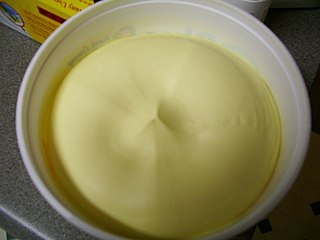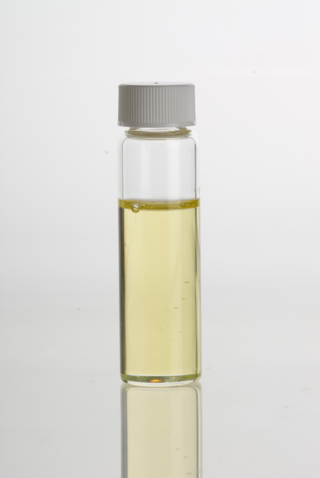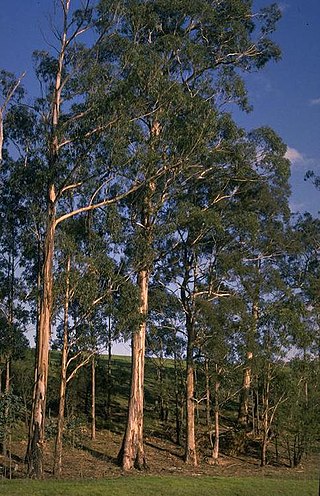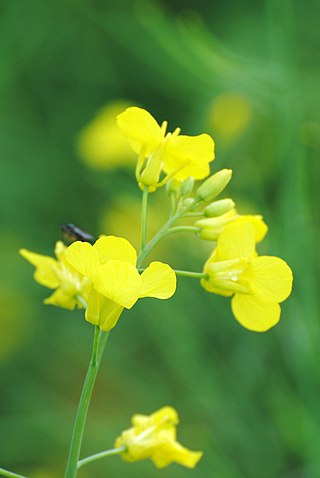
Palm oil is an edible vegetable oil derived from the mesocarp of the fruit of the oil palms. The oil is used in food manufacturing, in beauty products, and as biofuel. Palm oil accounted for about 33% of global oils produced from oil crops in 2014. Palm oils are easier to stabilize and maintain quality of flavor and consistency in processed foods, so are frequently favored by food manufacturers. On average globally, humans consumed 7.7 kg (17 lb) of palm oil per person in 2015. Demand has also increased for other uses, such as cosmetics and biofuels, creating more demand on the supply encouraging the growth of palm oil plantations in tropical countries.

Vegetable oils, or vegetable fats, are oils extracted from seeds or from other parts of fruits. Like animal fats, vegetable fats are mixtures of triglycerides. Soybean oil, grape seed oil, and cocoa butter are examples of seed oils, or fats from seeds. Olive oil, palm oil, and rice bran oil are examples of fats from other parts of fruits. In common usage, vegetable oil may refer exclusively to vegetable fats which are liquid at room temperature. Vegetable oils are usually edible.

Margarine is a spread used for flavoring, baking, and cooking. It is most often used as a substitute for butter. Although originally made from animal fats, most margarine consumed today is made from vegetable oil. The spread was originally named oleomargarine from Latin for oleum and Greek margarite. The name was later shortened to margarine.

An essential oil is a concentrated hydrophobic liquid containing volatile chemical compounds from plants. Essential oils are also known as volatile oils, ethereal oils, aetheroleum, or simply as the oil of the plant from which they were extracted, such as oil of clove. An essential oil is essential in the sense that it contains the essence of the plant's fragrance—the characteristic fragrance of the plant from which it is derived. The term "essential" used here does not mean indispensable or usable by the human body, as with the terms essential amino acid or essential fatty acid, which are so called because they are nutritionally required by a living organism.
gamma-Linolenic acid or GLA is an n−6, or omega-6, fatty acid found primarily in seed oils. When acting on GLA, arachidonate 5-lipoxygenase produces no leukotrienes and the conversion by the enzyme of arachidonic acid to leukotrienes is inhibited.

Sesame oil is an edible vegetable oil derived from sesame seeds. The oil is one of the earliest-known crop-based oils. Worldwide mass modern production is limited due to the inefficient manual harvesting process required to extract the oil. Oil made from raw seeds, which may or may not be cold-pressed, is used as a cooking oil. Oil made from toasted seeds is used for its distinctive nutty aroma and taste, although it may be unsuitable for frying, which makes it taste burnt and bitter.

Dysphania ambrosioides, formerly Chenopodium ambrosioides, known as Jesuit's tea, Mexican-tea, payqu(paico), epazote, mastruz, or herba sanctæ Mariæ, is an annual or short-lived perennial herb native to Central America, South America, and southern Mexico.

Eucalyptus globulus, commonly known as southern blue gum or blue gum, is a species of flowering plant in the family Myrtaceae. It is a tall, evergreen tree endemic to southeastern Australia. This Eucalyptus species has mostly smooth bark, juvenile leaves that are whitish and waxy on the lower surface, glossy green, lance-shaped adult leaves, glaucous, ribbed flower buds arranged singly or in groups of three or seven in leaf axils, white flowers and woody fruit.

Caryophyllene, more formally (−)-β-caryophyllene,(BCP), is a natural bicyclic sesquiterpene that is a constituent of many essential oils, especially clove oil, the oil from the stems and flowers of Syzygium aromaticum (cloves), the essential oil of Cannabis sativa, rosemary, and hops. It is usually found as a mixture with isocaryophyllene (the cis double bond isomer) and α-humulene (obsolete name: α-caryophyllene), a ring-opened isomer. Caryophyllene is notable for having a cyclobutane ring, as well as a trans-double bond in a 9-membered ring, both rarities in nature.

Eucalyptus oil is the generic name for distilled oil from the leaf of Eucalyptus, a genus of the plant family Myrtaceae native to Australia and cultivated worldwide. Eucalyptus oil has a history of wide application, as a pharmaceutical, antiseptic, repellent, flavouring, fragrance and industrial uses. The leaves of selected Eucalyptus species are steam distilled to extract eucalyptus oil.
May Creek Airport is a state owned, public use airport located one nautical mile (2 km) south of the central business district of May Creek, in the Valdez-Cordova Census Area of the U.S. state of Alaska. Scheduled passenger service is subsidized by the Essential Air Service program.
Mhlosheni is a town within south western Eswatini about 25 kilometres north-west of Hluthi and 75 kilometres west of Maloma.

Marico Limited is an Indian multinational consumer goods company providing consumer products and services in the areas of health, beauty and wellness. With its headquarters in Mumbai, Marico is present in over 25 countries across Asia and Africa. It owns brands in categories of hair care, skin care, edible oils, health foods, male grooming, and fabric care.

Tenakee Seaplane Base is a state-owned public-use seaplane base located in Tenakee Springs, a city on Chichagof Island in the Hoonah-Angoon Census Area of the U.S. state of Alaska. Scheduled airline service is subsidized by the Essential Air Service program.

Aromatherapy is based on the usage of aromatic materials including essential oils and other aroma compounds, with claims for improving psychological and physical well-being. It is offered as a complementary therapy or as a form of alternative medicine, the first meaning alongside standard treatments, the second instead of conventional, evidence-based treatments.

Bergamot essential oil is a cold-pressed essential oil produced by cells inside the rind of a bergamot orange fruit. It is a common flavoring and top note in perfumes. The scent of bergamot essential oil is similar to a sweet light orange peel oil with a floral note.
Young Living is a multi-level marketing company based in Lehi, Utah. Founded by Donald Gary Young in 1993, it sells essential oils and other related products.

Cooking oil is a plant or animal liquid fat used in frying, baking, and other types of cooking. Oil allows higher cooking temperatures than water, making cooking faster and more flavorful, while likewise distributing heat, reducing burning and uneven cooking. It sometimes imparts its own flavor. Cooking oil is also used in food preparation and flavoring not involving heat, such as salad dressings and bread dips.

Rapeseed oil is one of the oldest known vegetable oils. There are both edible and industrial forms produced from rapeseed, the seed of several cultivars of the plant family Brassicaceae. Historically, it was restricted as a food oil due to its content of erucic acid, which in laboratory studies was shown to be damaging to the cardiac muscle of laboratory animals in high quantities and which imparts a bitter taste, and glucosinolates, which made it less nutritious in animal feed. Rapeseed oil from standard cultivars can contain up to 54% erucic acid.













